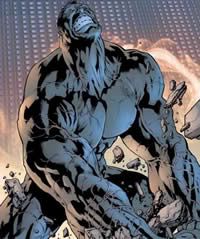 If you were to construct a list of the most volatile subjects among Hulk fans, the Ultimate line’s re-interpretation of the Hulk would be right up there with Bruce Jones’s run and Joe Casey’s snake. Hulk was first Ultimatized in Ultimate Marvel Team-Up #2-#3. The Ultimate Hulk wouldn’t show up again until Mark Millar and Bryan Hitch’s Ultimates, with Bruce Banner as second-in-command of the US government’s program to produce a super-hero team. Specifically, Banner’s job was to reproduce the super-soldier formula that created Captain America. Eventually, Captain America was found alive and frozen in a block of ice. With Banner’s job presumably made redundant because of this discovery, Betty Ross separated from him and dating movie stars, Hank Pym in Banner’s former leadership position, and people like Wasp and Tony Stark doing everything they can to antagonize him, Banner finds himself at the end of his rope. He had been cured of the Hulk after his initial transformation in Ultimate Marvel Team-Up, but purposely injects himself with a mixture of the old Hulk serum and Captain America’s blood in Ultimates to become the Hulk once more. As it was in the MU proper with the Avengers, the Ultimates’s first action is taken to control the Hulk, and Thor joins the team as a result. The Hulk who rampages through the Ultimate world’s Manhattan ain’t the misunderstood, good-hearted beast many Hulk fans have grown up with. The crimes committed by the Ultimate Hulk include mass murder, cannibalism, and (arguably, considering a scene from the previews of Ultimate Wolverine vs. Hulk) rape.
If you were to construct a list of the most volatile subjects among Hulk fans, the Ultimate line’s re-interpretation of the Hulk would be right up there with Bruce Jones’s run and Joe Casey’s snake. Hulk was first Ultimatized in Ultimate Marvel Team-Up #2-#3. The Ultimate Hulk wouldn’t show up again until Mark Millar and Bryan Hitch’s Ultimates, with Bruce Banner as second-in-command of the US government’s program to produce a super-hero team. Specifically, Banner’s job was to reproduce the super-soldier formula that created Captain America. Eventually, Captain America was found alive and frozen in a block of ice. With Banner’s job presumably made redundant because of this discovery, Betty Ross separated from him and dating movie stars, Hank Pym in Banner’s former leadership position, and people like Wasp and Tony Stark doing everything they can to antagonize him, Banner finds himself at the end of his rope. He had been cured of the Hulk after his initial transformation in Ultimate Marvel Team-Up, but purposely injects himself with a mixture of the old Hulk serum and Captain America’s blood in Ultimates to become the Hulk once more. As it was in the MU proper with the Avengers, the Ultimates’s first action is taken to control the Hulk, and Thor joins the team as a result. The Hulk who rampages through the Ultimate world’s Manhattan ain’t the misunderstood, good-hearted beast many Hulk fans have grown up with. The crimes committed by the Ultimate Hulk include mass murder, cannibalism, and (arguably, considering a scene from the previews of Ultimate Wolverine vs. Hulk) rape. The only thing that threatens to make Banner more sympathetic than his alter-ego is that he can’t eat the people who abuse him. He’s thoroughly pissed on by most of the Ultimates even before he tears through Manhattan, but in the end you get the sense that he deserves it. The Ultimate Bruce Banner is insecure, self-involved, insulting, and expresses concern only for himself after his rampages.
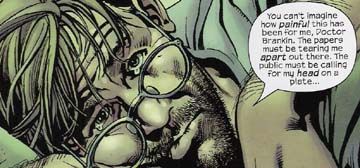
I’ve read a lot of debates about this subject on the Net, and the guys who like the Ultimate Hulk tend to say a lot of the same things. A lot of readers feel that this interpretation is a more genuine one. There’s a sense that people feel the more puritanical sensibilities of super-hero comics are what made the Hulk anything close to a hero, and that Millar’s drunken nurse-eater is a more real examination of the dark side of humanity. I think there’s some validity there. Reading the early issues of Hulk, the character seemed like an uncomfortable mix between the old Marvel Monsters and new super-heroes of the time, which may in part explain why the original series only lasted six issues.
Another point the fans of Ultimate Hulk tend to bring up, and rightly so, is that if you don’t like it, you don’t have to buy it. Fans who can’t handle the idea of Millar and Co.’s reinterpretation of their favorite character don’t have to handle it. They can completely ignore the Ultimate universe.
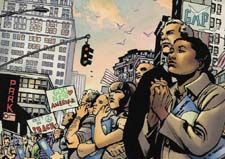 I have two problems with these arguments. First, while the Ultimate line’s less strict view of morality doesn’t limit the kind of Hulk stories that can be told, it does limit the kind of stories that can be told with the Hulk as a hero. Maybe I’m wrong, but I don’t think you can sell a mass-murder/rapist/cannibal as a sympathetic comic book protagonist. As soon as the smoke cleared in Manhattan after the Hulk’s rampage, and the artwork went as far as it could to make it look like NYC during the aftermath of 9/11, any hope of the Ultimate Hulk ever being portrayed as anything close to a super-hero was destroyed.
I have two problems with these arguments. First, while the Ultimate line’s less strict view of morality doesn’t limit the kind of Hulk stories that can be told, it does limit the kind of stories that can be told with the Hulk as a hero. Maybe I’m wrong, but I don’t think you can sell a mass-murder/rapist/cannibal as a sympathetic comic book protagonist. As soon as the smoke cleared in Manhattan after the Hulk’s rampage, and the artwork went as far as it could to make it look like NYC during the aftermath of 9/11, any hope of the Ultimate Hulk ever being portrayed as anything close to a super-hero was destroyed. And maybe that’s okay. Maybe it’s okay for Ultimate Hulk to be a villain. It doesn’t affect the regular MU Hulk, does it?
Or does it?
And that’s my second problem. Spillage. Whenever we get an alternate interpretation of an established character, and that interpretation is met with the kind of success Ultimates has enjoyed, the Powers That Be tend to bring the originals closer to the alternates. Every time Joe Quesada talks about the possibility of splitting up Peter Parker and Mary Jane, he almost always mentions the success of Ultimate Spider-Man. While I haven’t read Captain America in a while, the original's costume was re-designed after the success of Ultimates to make it look more like the WW II era Cap of Ultimate Marvel. The regular MU Nick Fury has certainly started to borrow the Ultimate Fury's more manipulative aspects. Simply the idea of killing villains is becoming more acceptable in the MU proper, while the morality of it never seems to even be questioned in the Ultimate line. I wouldn't doubt that when Thor returns to the regular MU, he'll be re-worked to resemble the Ultimate version in certain ways.
We're already seeing the debris of the Ultimate Hulk affect the original. With New Avengers: Illuminati, the idea that the Hulk has killed large numbers of people during his rampages was made fact, and helped to inform the decision to exile him to outer space. If the less-than-subtle hints about a post-Civil-War "Hulk vs. Everybody" event sees fruition, it's likely this will be brought up again. I wouldn't doubt we'll see, considering the trend in Marvel and DC towards casual slaughter of super-heroes, Hulk killing a few masks here and there.
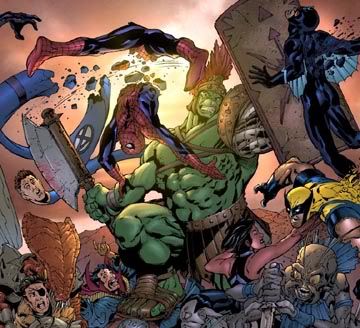
I doubt we'll ever see a Hulk in the MU proper who eats people, but I am concerned with what the point of all this is. Judging by Bendis's reactions to Hulk fans' complaints about New Avengers: Illuminati, the only point I can see is that in real life, people would die because of the Hulk's rampages. Okay, maybe, but as Dan Slott pointed out, what super-hero heavyweight wouldn't have a similar death count on his/her conscience? Hell, forget the heavyweights. Spider-Man can lift trucks. How many times has this guy fought non-powered muggers, mafia hoods, would-be rapists, etc.? How could a guy with that much physical power hold back enough to not kill every single non-powered man or woman he's ever struck? We tend to think of Spidey as a lightweight because we've got the heavies like Hulk, Thing, and Thor to compare him to, but I have a tough time believing that, in real life, if I had the physical strength to lift a truck over my head that I could do so much as punch a man in the face without pushing his nose through the back of his skull.
The point being that when you start writing super-heroes in certain ways just because that's what they would be like "in real life," you're starting down a slippery slope. There's nowhere else to go because super-heroes do not, and cannot, exist in real life, which, duh, is probably one of the reasons we like to follow their adventures. Once everything starts revolving around what these impossible characters would be like in a possible world, you whittle away everything that makes super-heroes "super." What you end up with may very well be an intriguing story, but if you're writing ongoing characters set in a broad mythology like the Marvel Universe, then the result is going to be the death of the franchise. You can't just brush off the Hulk becoming a mass murderer. It's one thing to have Wolverine or Punisher carve up hordes of ninjas, it's another to have a household name killing more innocent civilians than Osama Bin Laden or the Hiroshima nuke.
The Hulk has rarely been a bonafide super-hero in the rigid definition of a character who consciously fights for what h/she believes to be justice. He’s fought villains and saved the world, but in many cases he’s done “what’s right” because what was right coincided with his goals of freeing himself from the various villains, heroes, and government agencies who hounded him. It was only during the various periods that Banner won some mental control over the Hulk’s body that he purposely fought villains for purely altruistic reasons. The Hulk’s heroism is much more personal, in that it lies in his determination to never be made prisoner or servant to anyone else.
For better or worse, Millar’s Hulk has been stripped of any chance to be a hero in any sense. He’s more like Hannibal Lecter than the Hulk of the MU proper. He’s less personable and more destructive even than the Mr. Hyde of The League of Extraordinary Gentlemen, and, if it’s possible, more sexually horrific. Unless Marvel decides to put on some Jemas-like continuity blinders to the "revelations" of New Avengers: Illuminati, I worry that the success of Millar's Ultimate Hulk is going to continue pulling the original down the same path.
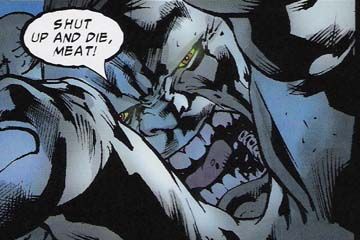

No comments:
Post a Comment